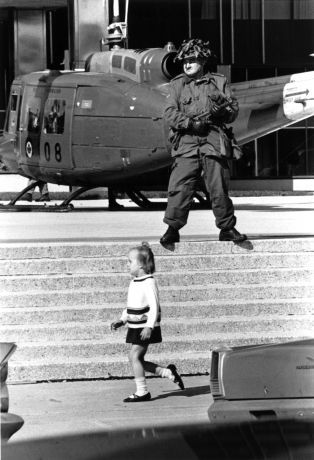Features
You are here
The October crisis: Pierre Trudeau and the suppression of civil liberties

October 13, 2014
“Every government in this country is well aware of the existence of deep and important social problems…there is available everywhere in Canada an effective mechanism to change governments by peaceful means.”
Those were Pierre Trudeau’s words on October 16, 1970 in a televised statement justifying using the War Measures Act (later the Emergencies Act, 1988), supposedly to confront members of the Front de Libération du Québec (FLQ).
Trudeau hypocrisy
Trudeau, as a student years earlier, wrote a “Letter from London” chastising the use of the War Measures Act by the MacKenzie King government, which acted “outside the bounds of Common Law and in violation of justice, without due process, adequate defense, known punishment, nor with judgement independent of the executive branch.” In a display of liberal hypocrisy that would rival today’s politicians, Trudeau’s words eloquently describe his own government’s actions in October 1970.
Within days of the Front de Libération du Québec (FLQ) kidnapping British Trade Commissioner James Cross and Quebec Labour Minister Pierre Laport, military were patrolling the streets and habeas corpus suspended, permitting the arbitrary arrest and detainment of anyone suspected of FLQ ties.
While Trudeau is falsely praised as a champion of charter rights, his defence of the War Measures Act provides a different story: “There are a lot of bleeding hearts around who just don’t like to see people with helmets and guns. All I can say is, go on and bleed, but it is more important to keep law and order in this society than to be worried about weak-kneed people who don’t like the looks of a soldier’s helmet... So long as there is a power in here which is challenging the elected representative of the people I think that power must be stopped and I think it’s only, I repeat, weak-kneed bleeding hearts who are afraid to take these measures.” A reporter asked, “At any cost? How far would you go with that? How far would you extend that?” His infamous answer: “Well, just watch me.”
Civil liberties and national liberation
While the Act was in effect, 465 people were arrested and hundreds jailed without charge. Only two were actually convicted of FLQ ties and none provided information leading to the kidnappers.
Indeed, many had nothing to do with the FLQ. A 2010 Radio Canada investigation revealed Quebec police had “at most 60 names” of FLQ sympathizers, so the RCMP (under political pressure to bolster numbers to justify such extreme measures) added hundreds to the list, likely from their PROFUNC arrest list of over 60,000 suspected communists and sympathizers .
As then NDP leader Tommy Douglas remarked, they were “using a sledgehammer to crack a peanut.” But perhaps such state action against civilians is not intended to simply uphold “rule of law” or “public safety,” but for control.
Trudeau’s use of the War Measure Act had little to do with capturing the kidnappers. Since 1962, when the FLQ were deemed a possible terrorist threat by the RCMP, they and other separatist movements were seen through the lens of Cold War anticommunism, in the same vein as “national liberation struggles” .
The use of the War Measures Act in 1970 (which had overwhelming approval in English Canada) can perhaps be seen in the context of McCarthyesque ideological hysteria against those deemed an ideological threat, in Quebec and beyond. As Montreal Gazette columnist Don MacPherson wrote, “Many Quebecers remain convinced…the Trudeau government applied the War Measures Act not only to deal with the crisis…but as a psychological ploy to halt the rise of the Quebec nationalist movement.”
State repression
It is commonly said the October Crisis is unique in that the War Measures Act was used in a time of peace. This, however, misses the purpose and function of such extra-constitutional executive powers in Canada and other western democracies: namely, to ensure conformity when dissent and debate is most dangerous to state power, albeit most necessary.
The peacetime distinction of the October Crisis neglects the idea of perpetual war, whereby imperialist states need an enemy, internal or external, to legitimize their own use (or threat) of force.
To understand this function, we can look to when the War Measures Act, 1914 was first passed in the imperialist jingoism of World War I. In Canada, the War Measures Act was used to declare foreigners “enemy aliens,” to intern over 8,600 mostly Ukrainians, and make it illegal to hold meetings, or publish in a foreign language.
The War Measures Act would later be used during and after WWII—against communists and socialists; to intern Japanese Canadians; to control wartime strikes and lockouts; to enforce conscription; and censor the wartime press.
Civil liberties today
Much has changed since, and these events are seen as unfortunate aspects of history. However, the precedent is perhaps more relevant than ever. We are in a new paradigm, where the implications of information and surveillance technology on civil liberties may not even be comprehended.
For example, the NSA revelations (and Canada’s response) are truly frightening in a context where those in power have routinely employed extreme measures to collect dossiers on, infiltrate, and detain anyone deemed a threat to established power.
Events surrounding the Toronto G20 showed how today, executive branches in Canada infiltrate and entrap those exercising their democratic and constitutional rights. Leaked information, such as that from Stratfor shows how corporations now employ surveillance technology and state informants to monitor and silence critics.
Events like the October Crisis, and other temporary suspensions of civil liberties by the state, are now overshadowed by ongoing and routine violations of constitutional rights that transcend national boundaries. The fight for civil liberties continues.
Section:









